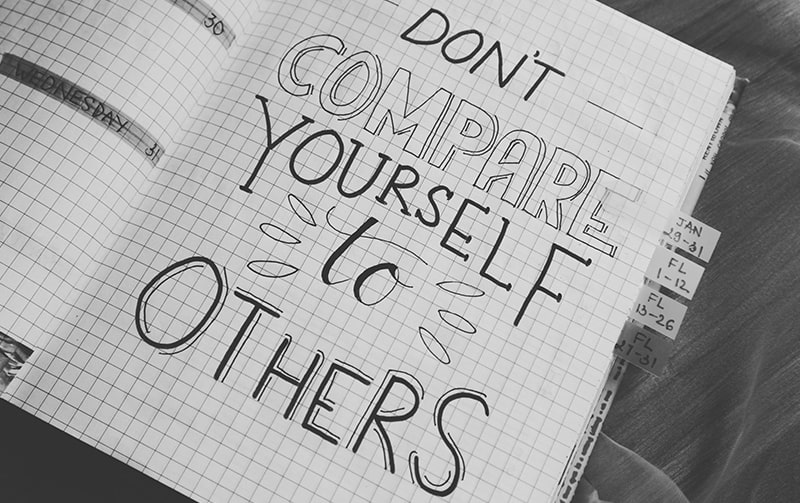You want right write good blog articles and offer your readers a real added value? Now that I've written over 500 texts of my own and learned a lot, I'd like to share my best writing tips with you. Especially if you are dealing with a rather dry environmental topic like the climate change or the Water shortage and the texts should be crisp and convincing - it certainly can't hurt.
You will learn in this article how to build all your texts in the blog optimally in the future and how to write good, search engine optimized texts.
Here is a short Table of contents for you:
- Unique texts
- Writing blog articles - step by step
- Writing SEO texts
- The ideal spelling
- Basic tips
- Closing words
Write good blog articles that are unique

The Internet is teeming with poorly copied and unhelpful texts. It is supposed to be quick and cheap. Wrong! Fast, cheap texts are a waste of money and time, because in the end nobody gets anything out of it. Especially if you want to save people from Zero Waste Lifestyle or other sustainability topics, texts need a bit more power. For unique, good articles, the following should apply to your blog text:
- Your blog text provides real added value for the reader
- It answers a question or solves a problem
With this, you have a healthy base to write your blog article. Now I want to give you all the tips to write your blog article, taking into account the readability and optimization for search engines.
Writing good blog articles - A guide
First of all, I would like to give you a good structure and step-by-step instructions so that you can write really good blog articles in the future. To do this, follow the steps below.
1. formulate a gripping headline
A boring headline will not be clicked and what is not clicked is apparently not interesting. Even if a bad headline hides a unique text, many readers won't even know that. So if you want to write a good blog article, the headline has to fit as well. In addition to an integrated keyword, you should also make sure that the headline really describes exactly the topic that you are dealing with in your text.
Example: Animal welfare in everyday life - How you can help animals
2. create structure = table of contents with links!
What are the topic and headline of your blog article? Before you will write your text now, you should think carefully about which subtopics or subheadings are interesting for your post. In this example, the topic is "Writing blog articles" and good subtopics are, for example, "Writing SEO texts", "Text structure" or the "Writing style".
Make clear what the reader will be particularly interested in this topic and use the Google AdWords Keyword Planner or autosuggestion for inspiration. From the sub-topics you then develop a table of contents of your blog article, in which you send each chapter by link to the appropriate place in the text.
3. crisp introduction to the text
You were able to write a gripping headline for your blog post and find a good structure? That's a good basis for your unique text. Now you need to guide the reader through the text and explain in a few words what your text is about. Formulate a captivating introduction that picks up your structure from the table of contents. Make sure that the reader of your blog article now really wants to read your text!
Example: see Vegan Docs - Movies for Vegans & Vegetarians
4. no paragraph longer than 300 words without subheading
If you want to write a good blog article, no paragraph should be longer than 300 words. If you read a text without paragraph and without subheading, it will limit the readability of your text. So if you want to write a good text, keep the paragraphs short and crisp.
5. write texts at least 700 words long
As an (environmental) blogger, you naturally want to achieve reach with your project. You get this reach if you can be found in the Google search results with the blog post that you have written. So if you want to write a good, findable blog post, then this text should have at least 700 words. However, I recommend that you settle in between 1500 - 2500 words with each post. Of course, you should only write as much in the blog post as your topic allows.
6. incorporate appropriate images into the text
A text without pictures is a lost text. We humans crave simple, relaxing images. Either you integrate images normally in the editor of your website or you embed them using social media like Instagram or Pinterest. Of course, this is optimal if the Instagram images are from your own channel.
If you use someone else's images, you must always get permission. At Pexels e.g. you can find free stock photos. Do not include too many images, as this will increase the loading time of your website. Please remember to minimize the images, so that the images are only as big as they really need to be.
7. write summary at the end of the texts
Today, texts on the Internet are only skimmed for the most important things. At the end of a blog article, it therefore makes sense to provide a summary or a conclusion of the article that solves the initial question or problem. This way, even those readers who are in a hurry will be satisfied with your blog article. In this section, therefore, you should really only summarize the very most important things from your text. Finally, please encourage interaction. Comments enliven your blog article and create a basis for discussion - this is especially important for environmental topics!
Writing good SEO texts

Now you know how to write a blog post step by step. You should not only write good articles, but also really good SEO texts. SEO is the abbreviation for search engine optimization and in this context means nothing more than writing a blog post that will also be found by search engines like Google. Consider the following recommendations so that you can write good SEO texts
8. be clear about the 2 most important keywords!
Writing SEO texts also means to focus not on many but 1-2 important keywords. This increases the likelihood that you will land on a top position for exactly these keywords and not on the second page of the search results for many keywords. With WordPress plugins like SEO Yoast you can define these keywords and get SEO tips to improve your Google ranking.
Example: "Cruelty to animals" + "Maltreatment of animals".
9. research further keywords relevant to the topic
Besides the 1-2 most important keywords in your blog post, you should still mention other topic-relevant keywords in your article. For example, if you want to write a blog post that deals with the topic of online text writing, you should also include terms such as "blogger", "blog article", "search engine optimization" or "text structure". This suggests to the search engine algorithm that the text really deals with the specified topic and was not just flat SEO-optimized.
Example: "Cruelty to animals" | "Sensation of pain" + "Animal testing„
10. keywords in the headline of your article
Your title should be exciting, but of course also contain the most important keyword of your blog article. One keyword in the title is enough, because you don't have that many characters at your disposal! If you want to write a really good SEO text, then you manage to place the keyword right at the beginning of the title. This will increase the chances of your blog article landing at the top for the most important keywords.
11. headline of the text as H1 tag
If you want to write good SEO texts, you lay the foundation with a keyword in the title. But with the title in the H1 tag (HTML code of a title) it goes even better. Check whether your titles are also displayed as H1 tags. If not, you should change it, because an H1 tag around your headline will push your blog post higher up in Google than an H2 tag.
12. structure for H1-H4 tags in text
From an SEO point of view, the H1 tag should of course only appear once in your text, as it refers to the title. If you want to write really good SEO texts, then you should also use the other tags from H2-H4 sensibly. In this blog article, the subheadings from the table of contents are tagged with H2 and the respective tips with H3. This creates a clear hierarchy among the headings, which makes it clear to the Google algorithm how the text is structured. This way your informative text will be found better by Google.
13. keep keyword density of 2.5 - 5 percent in the article
If you want to write good blog articles, you should also make sure that there are not too few and not too many keywords in the text. A too low number of keywords will not bring you a good ranking in search engines and a text with too many keywords is lousy to read and can also be judged by Google as keyword spamming. Therefore, keep a keyword density of about 2.5 - 5 percent. This means that in a text with 1000 words, a maximum of 25 - 50 words should be important keywords.
14. set internal links to other articles
With every text written in your blog, you have another opportunity for an internal link. And if you link from one of your posts to another post on your website, Google appreciates that very much. Because this creates an internal, clear link structure.
Tip: Try to formulate the respective anchor text (the text that links) in such a way that it also contains the keyword for the text to be linked.
15. add ALT text to images
If you integrate images into your post, you can also give them an ALT text with the most important keyword. On the one hand, you can generate traffic via Google Image Search and on the other hand, the entire post will be found even better for the respective keyword. This is one of the SEO tips that very few people implement and where you can get a real advantage.
Writing good blog articles

The previous tips can be implemented directly by everyone, but you will probably have to work on the spelling step by step. My texts were also much worse at the beginning of my online time than nowadays. So before you start writing your blog post, I want to give you some tips on proper writing and phrasing.
16. you should write unique texts
Please avoid writing boring or poorly copied blog articles. As a reader, you can immediately tell if the author is serious. And if readers bounce, Google also knows that the text is not so unique! Try to find your own emotional and authentic style and your readers will appreciate it. Because continuity and recognition value and excitement while reading are desired!
17. write blog article that is readable and understandable.
If a text consists only of long sentences and there are no photos to be seen, then this is already visually a deterrent text. To keep your readers happy, you should write texts that offer variety and breaks while reading. Use bullet points, lists, tables and other eye-catchers.
Also, try to avoid using technical terms from your subject area and always formulate them in layman's language. This way everyone can follow your thoughts and you have written a readable and understandable text.
18. writing dynamic texts
Try as much as possible to avoid filler words like "basically", "somehow" and so on, so that your blog articles remain dynamic and the reading flow is not disturbed by superfluous empty words. You should write lively texts. You can do this, for example, with active verbs! For example, instead of "writing dynamic texts", write "texts that carry the reader along". Throw everything out of your text that makes it unnecessarily bloated.
19. do not write slick blog articles
You also have to take offense with your text. It's your own blog and you can pretty much do what you want there! Write your clear opinion and don't always take the path of least resistance, which hopefully pleases everyone. Critical texts also share better on social media and are a conduit to sharper engagement with the content. This is especially important for texts about sustainability.
Writing Blog Articles - Basic Tips

Here I would like to give you some basic tips for writing online texts, which did not fit into the previous blog article.
20. do research for your text
Nobody can know everything. Before you write your text, you should do some proper research! Look for additional information that will make your text a real added value for the reader. Also look for unique photos that you may use. Sometimes the ratio of time spent on research and text writing is 50:50 for me.
Tip: Also include your sources! This is how you stand out from other texts that are unscientific. Facts and figures on environmental issues spread
21. prewrite your blog article
Writing a really good blog article can take a day! Super annoying when it is then gone due to an internet problem or laptop crash, right? Even if there are already AutoSafe functions in WordPress, for example, you should be on the safe side and prescribe your text offline with Word and save it regularly. I already had the pleasure once and that has pointed me to take this problem very seriously 😉.
22. write text with common font
Trying new fonts can be exciting, but humans are creatures of habit. Heed this SEO tip and choose a common font like Arial, Helvetica or Times New Roman with a relatively large font size. These are great to read and won't overwhelm your reader. Result: The reader stays longer on your page and is satisfied. In the Google search results, you will rank better!
23. check spelling after completion
The moment when you read a text and find four mistakes in the first three sentences. What do you do? You jump off, because you can't take the text seriously anymore. It takes quite a lot of time to read the whole text again and you are glad that it is finally online. But those are lousy excuses for not checking the text again. Just read through your blog post again and revise mistakes.
Tip: I have also included a few errors in this text for sure. If a reader notices an error, he can report it to me under the post. I can only recommend this to you!
24. update your blog post regularly
Things and opinions change all the time. Therefore, you should also regularly refresh your blog posts. This pleases the reader and of course the search engine! As soon as you receive new information about a topic you have already written about, update the post briefly and change the date of publication to the current day. This way your readers will know that you have updated the post.
25. encourage interaction with the blog article
At the end of your blog article, you should always encourage your readers to comment their opinion, suggestions or questions under your post. This gives you feedback and will further improve the way you write your blog articles. Google is also happy, as high user interaction indicates interesting content.
Writing blog articles? Easy, right?

I hope that you can now write really good texts that offer your readers real added value. In the best case, I have inspired you to dedicate yourself with your own blog to the fight against the greatest environmental problems of our time to dedicate themselves to it. For this, an extremely large amount of educational work is still necessary.
Stick to the rules, write rousing lyrics, but also make it a point to be in all the sustainable search engines to be found. Be clear about the most important keywords, build the structure of your text and write a unique blog post in your personal, recurring style.
Do you have any questions or suggestions? Then just comment below this article.
Stay motivated and sustainable,

PS: Gute Texte schreiben kannst du jetzt! Hast du dich auch schon einmal damit beschäftig, ein to create a sustainable company? You get the tips in the linked post. Good luck!





